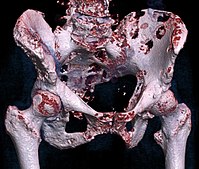
Photo from wikipedia
Abstract Background Conflicting results has been reported regard osteoporosis and fractures in patients with Differentiated Thyroid Cancer (DTC). Our objective was to evaluate the long‐term effects of TSH suppression therapy… Click to show full abstract
Abstract Background Conflicting results has been reported regard osteoporosis and fractures in patients with Differentiated Thyroid Cancer (DTC). Our objective was to evaluate the long‐term effects of TSH suppression therapy with Levothyroxine (LT4) on trabecular bone score (TBS) and bone mineral density (BMD) in females with DTC after thyroidectomy. Methods About 145 women with resected DTC and receiving long‐term TSH therapy, were stratified according to the degree of TSH suppression. Mean duration of follow‐up was 12.3 ± 6.1 years. BMD and TBS, were assessed using dual‐energy X‐ray absorptiometry (DXA) and TBS iNsight (Med‐Imaps), at baseline (1‐3 months after surgery) and at the final study visit. Results In patients stratified by duration of TSH suppression therapy (Group I, 5‐10 years; Group II, >10 years), slight increases from baseline TSH levels were observed. Significant decreases in LS‐BMD and FN‐BMD were seen in patients after >10 years. TBS values were lower in Groups I (1.289 ± 0.122) and II (1.259 ± 0.129) compared with baseline values (P = .0001, both groups). Regarding the degree of TSH suppression, TBS was significantly reduced in those with TSH < 0.1 µU/mL (P = .0086), and not in patients with TSH suppression of 0.1.‐0.5 or >0.5 µU/mL. Conclusions We found deterioration of trabecular structure in patients with DTC and TSH suppression therapy below 0.1 µU/mL and after 5‐10 years of follow‐up. Significant changes in BMD according to TSH levels were not observed. Trabecular Bone Score is a useful technique for identifying thyroid cancer patients with risk of bone deterioration.
Journal Title: Cancer Medicine
Year Published: 2020
Link to full text (if available)
Share on Social Media: Sign Up to like & get
recommendations!